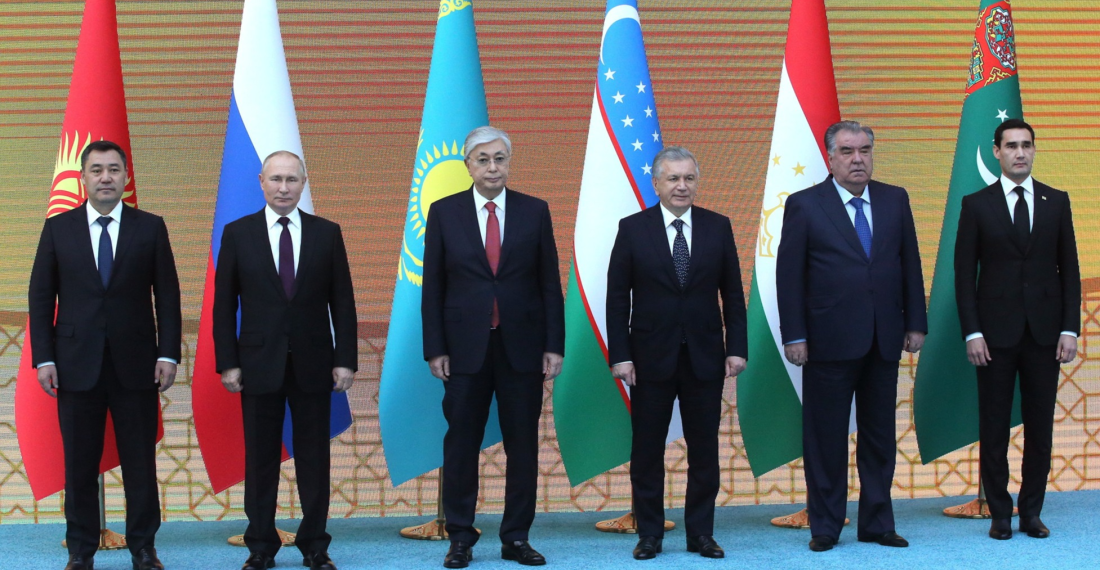"As Russia tries to manage its internal challenges, Central Asian countries are treading carefully, prioritising stability and cooperation and avoiding involvement in Russia's internal affairs," writes Arianna Belluardo in this op-ed for commonspace.eu. "While maintaining economic and diplomatic ties with Russia, however, Central Asia is also feeling out other opportunities amid shifting regional dynamics, not least with China, whose influence in the region is indeed growing, but remains in Russia’s shadow at least for now."
While the speculation over Vladimir Putin’s control over the Russian Federation spreads around the world after the Wagner mercenary group staged an abortive mutiny on 23-24 June, the Central Asian republics are treading carefully. Although they have tried to distance themselves from Moscow’s actions in Ukraine, Central Asian trade with Russia rubs along in the background. Meanwhile, increasing Central Asian ties with China - Russia’s great Eurasian ally and rival - are gradually changing the geopolitical landscape.
While the Central Asian republics may hold doubts about to what extent Vladimir Putin wields control over the Russian government and its military campaign in Ukraine, they are aware that openly casting aspersions on Putin's domestic situation could invite backlash. As of now, Central Asian leaders are primarily focused on avoiding involvement in Russia's internal affairs.
Kazakhstan's President Kassym-Jomart Tokayev recently held a National Security Council meeting to discuss the recent events in Russia, but publicly stated that the matter is an “internal affair of Russia”. Meanwhile Uzbek President Shavkat Mirziyoyev mentioned that he had a phone conversation with Putin but did not provide any details. Other Central Asian leaders remained silent on the matter altogether.
Whether Wagner’s machinations in Russia may weaken Moscow’s influence in Central Asia to China’s benefit is, for now, up for debate. “Chinese and Russian power plays in Central Asia are complex and subtle,” wrote Temur Umarov and Alexander Gabuev in a recent op-ed for Foreign Affairs. And, although China has serious interests in Central Asia, Russia remains the dominant power and holds considerable levers of influence, especially economic ones.
This is not to discount growing Chinese activity in the region, however. Chinese goods accounted for the largest share of Uzbekistan's imports during the first five months of 2023, amounting to $3.7 billion; and China-Kazakhstan trade turnover in 2022 grew 34% on the previous year, amounting to $24.1bn over the 12 months. All evidence would suggest this trend will continue.
As far as the Russia-Ukraine war is concerned, Kazakhstan has said that China’s proposed peace plan for Ukraine - which was rejected by Kyiv for failing to explicitly call on Russian troops to withdraw from occupied territories - was “worthy of support”. The Kazakh Foreign Ministry said that adherence to the UN Charter is crucial, and emphasised support for the United Nations as an indispensable global organisation for upholding the principles of “territorial integrity, independence and sovereignty of the state”.
On the other hand, the EU and the wider West - which also see strategic opportunities in Kazakhstan and Central Asia as a whole - have continued supplying Kyiv with huge tranches of military aid to support its ongoing counteroffensive, calculating that any mediated ceasefire would disproportionately benefit Russia by allowing its forces to regroup and resupply for potential future military actions.
As Russia tries to manage its internal challenges, Central Asian countries are treading carefully, prioritising stability and cooperation and avoiding involvement in Russia's internal affairs. While maintaining economic and diplomatic ties with Russia, however, Central Asia is also feeling out other opportunities amid shifting regional dynamics, not least with China, whose influence in the region is indeed growing, but remains in Russia’s shadow at least for now.
source: Arianna Belluardo is a Junior Research Associate at LINKS Europe
photo: Getty Images
The views expressed in opinion pieces and commentaries do not necessarily reflect the position of commonspace.eu or its partners.







